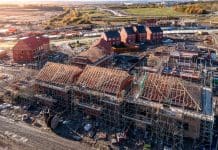A major report assessing a quarter of a century of developer-led regeneration in Greater Manchester concluded that it has done very little for the vast majority of people living there. One of the study’s authors, Professor Karel Williams of Alliance Manchester Business School at the University of Manchester, explains its findings
Developer-led regeneration is a good servant but a bad master. That’s the message of our new report on housing and transport in Greater Manchester, which raises serious questions about what 25 years of developer-led regeneration have done for most of the 2.5m citizens who live in the 10 boroughs of Greater Manchester.
Of course, we should recognise the transformation of the city centre through the development of high-rise flats and offices – the inner-city population has increased from a few hundred people in the 1980s to more than 30,000 today.
This shiny, rebuilt centre does impress London journalists, but it offers very little to citizens from the outer boroughs like Bolton or Oldham beyond another choice of a city-region shopping destination, a Saturday night out or a holiday flight from the airport.
The process of developer-led regeneration is driven by borrowed money, so the sector moves through cycles of boom and bust according to the stop-and-go of credit availability. At present, with so many cranes on the skyline, Manchester is in the later stages of a boom, as it was in 2007-08 before the financial crisis. By 2018, we have 11,000 flats under construction, mainly in high-rise blocks, with six towers of more than 25 storeys currently being built, and many more planned.
In many cases, this kind of capitalist development cycle leaves behind useful infrastructure. As, for example, in the dot com financial bubble of the late 90s, which funded the development of firms like Amazon that we all use today. The problem with developer-led regeneration of housing on the Manchester scale is that it meets investor needs, not citizen wants and leaves behind too many homes of the same type, often without neighbourhood facilities.
In London, developers are building luxury flats for high net worth investors. In Manchester, as in other Northern cities, the established model is to maximise returns by building high and selling more modest one- and two-bed buy-to-let flats in or near the centre. And developers have been doing this (on and off) for the past 25 years, with transformative consequences for the central city.
The number of flats in the two inner boroughs of Manchester City and Salford increased by nearly 45,000 between 2001 and 2014. These new flats have been mainly rented to 25 to 34-year-old junior white-collar workers, who increasingly live and work in the centre; the number of 25 to 34-year-olds has actually declined in the eight outer boroughs.
There is very little social payback from such developments because developers are resourceful in avoiding Section 106 obligations – the legal requirement on those granted planning permission to consider the impact on communities and infrastructure.
Developers are, instead, presenting spreadsheets that show their projects are not viable if they are obliged to contribute to social or affordable housing. A total of 61 residential projects – containing almost 15,000 flats – were granted planning permission by Manchester City Council in 2016-17. The Financial Times reports that not one of these flats was to be offered for social or at affordable rent.
With developers leading in this way, the social result is not mixed communities with social infrastructure. Instead, we have an inner-city monoculture of small flats for the post-student generation in big blocks separated by windy canyons.
The political reaction in 2018 is increased questioning of priorities inside and outside the inner borough councils because – justifiably or not – the councils appear to be facilitating the financial aims of developers more than serving the foundational needs of their citizens for housing.
Across all 10 boroughs, there is a chronic shortage of family housing with secure tenure at rents that take less than one-third of average earnings. Over the past 25 years, councils have been obliged to sell off social housing at a discount without any possibility of rebuilding. There are now 80,000 on the waiting list for social housing across all 10 boroughs and no one on this waiting list can afford the rents of £850-£1,150 per month that are being charged for new build one- and two-bed flats in the centre.
Small new build flats are in any case physically unsuitable because families need storage and play space outside the flat. And that raises further questions about who will bear the costs of dispersion when the young inner-city renters have children and need to move to larger homes in the outer boroughs. Here, they will have to pay the costs of commuting as well as rent or mortgage; and cheaper transport fares from the outer boroughs would require public subsidy from the taxes that we all pay.
Local and national politicians are beginning to engage with these issues. The Greater Manchester Spatial Framework is quite rightly being revised because the original draft of 2016 was about formatting the city centre and perimeter for developers and did not once mention social housing. UK politicians of all parties at national level now concede that we need to restart the building of social housing. They are vague about where the money is to come from – or who is to do large-scale building when neither local authorities nor housing associations have the in-house capability.
But the starting point must be that going forward in our cities, we need to do something more than encourage developers to build more homes. Because in Manchester and other Northern cities with developers as the masters under a permissive planning regime, regeneration is now part of the problem, not the solution.
We need something creative and experimental, like the English new towns movement after 1946, which ensures that developers serve the priorities of our citizens in building mixed communities with social infrastructure.
The full report, From Developer Regeneration to Civic Futures, can be downloaded from the foundationasleconomy.com website.
Karel Williams
Professor
Alliance Manchester Business School,
University of Manchester
Tel: +44 (0)161 275 6303
karel.williams@manchester.ac.uk
https://www.linkedin.com/school/manchester-business-school/
http://www.youtube.com/manchesterbusinessschool














![[VIDEO]Government launches new online appeal service for local planning authorities Group of young coworkers using computers in their group office, representing the new online appeals service](https://www.pbctoday.co.uk/news/wp-content/uploads/2025/12/iStock-2191280160-218x150.jpg)